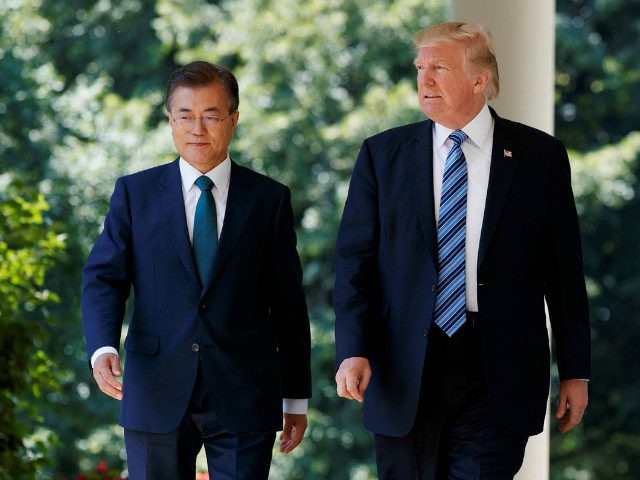North Korea’s increased belligerence in the face of new administrations in Washington and Seoul has culminated in a sixth nuclear test this weekend, an event President Donald Trump took as an opportunity to challenge his leftist South Korean counterpart, Moon Jae-in, on his policy of dialogue with the communist regime.
“South Korea is finding, as I have told them, that their talk of appeasement with North Korea will not work,” President Trump wrote on Twitter on Sunday, surprising some who expect a hard line from the president on China but not South Korea. “They only understand one thing!”
While Kim Jong-un’s communist dictatorship has proven comfortable with illegal nuclear development and outsized vitriol that has overshadowed even his predecessors – his father and grandfather – for presidents prior to Trump, President Barack Obama could rely on a strong ally in Seoul’s Blue House as a counterweight to his failed “strategic patience” policy.
Park Geun-hye, who preceded Moon as South Korea’s president, took a hard line against North Korea, limiting bilateral relations and expanding America’s influence in helping protect her country from a surprise missile attack. She approved the deployment of America’s Terminal High Altitude Area Defense (THAAD), a high-tech system designed to destroy any incoming missiles from far beyond South Korea’s borders, alarming China and Russia. Park, whose parents were both assassinated by the North Korean regime, was so hated in Pyongyang that the state newspaper, Rodong Sinmun, published a series of articles called “We Accuse Park the Bitch,” in which they referred to the president as a “cold-blooded animal,” “ugly old maid,” and “old cat groaning in her sickbed.”
Moon won the presidency following Park’s impeachment on unrelated accusations of having allowed a private citizen access to her foreign policy speeches before delivering them and being part of a cult. Moon’s victory was much less a referendum on Park’s North Korea policy as it was a stern national rebuke of cronyism and even the suspicion of corrupt activity.
Nonetheless, Moon took over in May and implemented a dramatically different policy towards North Korea, the result of which has been the testing of both an intercontinental ballistic missile (ICBM) and a nuclear weapon, and a nearly unprecedented missile launch over northern Japan.
Following Moon’s victory, North Korea celebrated with an editorial in Rodong Sinmun accusing “conservative groups” of being responsible for the entirety of “the tragic North and South Korean relationship.”
Among his first moves as president were the restoration of “civilian exchanges” with North Korea, in which the nations allow citizens of their respective countries temporary access to each other’s borders in an attempt to assuage tensions, and a proposal to dialogue with North Korea.
“Talks and cooperation between the two Koreas to ease tension and bring about peace on the Korean peninsula will be instrumental for pushing forth a mutual, virtuous cycle for inter-Korea relations and North Korea’s nuclear problem,” South Korean Unification Minister Cho Myoung-gyon said in July.
Moon went so far as to request that the Vatican intervene and “play a mediating role” between the two countries. Moon is Roman Catholic. North Korea is a communist nation that bulldozes Christians to death.
In addition to reaching out to North Korea, Moon initially appeared to push America away. Reports began surfacing shortly after his inauguration that Moon was in “extreme shock” over the expansive coverage of the THAAD system, ordering a temporary halt of its deployment.
To Moon’s credit, he was quick to approve new deployments of parts of the THAAD missile system following North Korea’s testing of a ballistic missile in July. That may be the beginning of Moon’s walk-backs on North Korea policy.
A Reuters report this week notes that North Korea’s nuclear test during the weekend appears to have triggered significant pressure within North Korea on Moon to take a more hardline stance against the Kim regime. “Moon, who swept to power after winning a May 9 election, remains hugely popular but his policy of pursuing both pressure and dialogue with the North is now under scrutiny,” Reuters suggests.
He faces pressure from abroad to change his stance, as well. In response to international condemnation, Moon reportedly told German Chancellor Angela Merkel that “the country will not overlook any additional provocation from now while expressing his intention to take punitive measures under cooperation with the international community, including the most powerful sanctions and pressure, stressing the need for strong and practical measures that North Korea can feel keenly.”
The international community needs these assurances from Moon to properly confront North Korea. While other neighboring countries like Japan – and non-neighboring countries like Israel, which must contend with the possibility of Iran buying a North Korean nuclear weapon – also face significant existential threats from the communist Kim regime, no nation has more to lose than South Korea. Without a reliably tough ally in Seoul, neither Trump nor other world leaders will have the necessary clout to limit the threat.

COMMENTS
Please let us know if you're having issues with commenting.